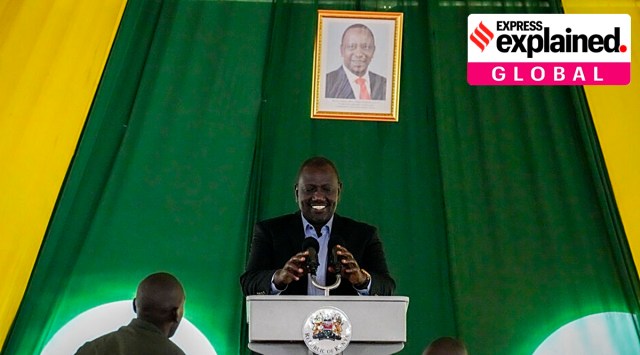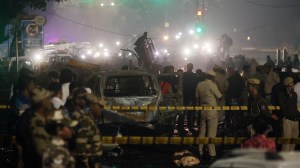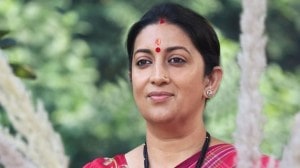Explained: Who is William Ruto, the controversial President-elect who won Kenya’s contested elections?
Just after the results, there was a split in the election commission and a possible threat of violence in east Africa’s third-largest economy.
 Kenya's President-elect William Ruto, stands under a photograph of current president Uhuru Kenyatta, as he prepares to address the media. (AP/File)
Kenya's President-elect William Ruto, stands under a photograph of current president Uhuru Kenyatta, as he prepares to address the media. (AP/File)William Ruto won the Presidential elections in Kenya earlier this month in an extremely close fight, even as the chaos continued and parties broke into fights at the election centre amid allegations of irregularities.
On August 23, his rival candidate Raila Odinga filed a petition in the Supreme Court, claiming a mismatch between the turnout figures and the result, and that many constituencies did not have their votes counted. “We have enough evidence to prove all of the criminality that occurred,” said Odinga at a press conference. Ruto has said he would be open to “engage” with any potential court challenges, and the development is being lauded by many for its emphasis on due process.
Ruto, who will seek to be the fifth president of the east African country since it declared independence in 1963, said his government “will have nothing to do with the blackmail we have seen, the threats we have seen, the fear sown around the country” due to different political views. He added, “If there will be court processes, we will engage because we adhere to the rule of law.”
Who is William Ruto?
William Ruto was the first elected Deputy President of the Republic of Kenya and was sworn into office in 2013.
As reported by The New York Times, Ruto was born in Sambut village near Eldoret town in Uasin Gishu County and had humble origins – hunting rabbits, raising sheep and cows and going to school barefoot. He comes from the third-largest ethnic group in Kenya, the Kalenjin. After studying botany and zoology at the university level, he got a doctorate in plant ecology.
In the 1990s, he began shifting his focus toward politics. It was in 1992 that Ruto began his political career through a church leadership for meeting and campaigning for then president Daniel Arap Moi at the University of Nairobi. In 1997, Ruto ran for and won the Eldoret North constituency’s parliamentary seat and was re-elected in 2002.
Known as a strong orator with a knack for drawing huge crowds at rallies, Ruto’s coalition Kenya Kwanza has won the majority of seats in the country’s upper house this time. Before being elected Deputy President, he held ministerial posts including agriculture and education.
Allegations of corruption and irregularities
In 2013, Ruto was accused of crimes against humanity for allegedly inciting ethnic violence after the 2007 presidential elections. The International Court of Justice charged Ruto and then President Uhuru Kenyatta for violence that left about 1,200 people dead and over 6,00,000 people displaced.
However, the case against Ruto collapsed in 2016 after the Kenyan government allegedly meddled with evidence and engaged in “witness interference and political meddling”, as per the court. Ruto has also been accused of corruption.
Ruto has a passion for agriculture and owns huge pieces of land across Kenya. The source of Ruto’s wealth has been questioned at various points and is often speculated on. In 2013, Ruto had been asked by a high court to surrender a 100-acre land after a farmer accused him of illegally taking it after the 2007 election violence.
In his election campaign, Ruto said that he will be bringing in an economic model that will benefit the poor and save them from bearing the brunt of the living cost crisis. As reported by the BBC, Kenya has a 40 per cent rate of unemployment among youth between 18 to 35 years.
The election chaos in Kenya
Ruto bagged 7,176,141 votes against his opponent Raila Odinga’s 6,942,930 votes, winning with a 50.5 per cent majority. The validity of the election results that led to Ruto’s win has been questioned by the opposition parties with videos on social media showing how the election centre saw protests, with chairs thrown after the result’s declaration.
An Independent Electoral and Boundaries Commission (IEBC) official who went missing while he was on duty as a returning officer was also found dead a day after the results.
Ruto’s main opposition candidate Raila Odinga, who led opinion polls, said he would challenge the results not just because of the close margin of the win, but also due to dissent within Kenya’s election commission.
The electoral commission of the country split before the result declaration. More than half of the commissioners – four out of seven – said the commission’s chair Wafula Chebukati excluded them from the declaration process.
“The four of us are here and not at Bomas of Kenya (a village in Nairobi), where results will be announced, because of the opaque nature of how this phase has been handled. We, therefore, cannot take ownership of the results that will be announced. However, we have an open door that people can go to court and because of the same, we urge Kenyans to be peaceful because the rule of the law is going to prevail,” the Standard quoted IEBC Vice Chairperson Juliana Cherera as saying.







- 01
- 02
- 03
- 04
- 05































